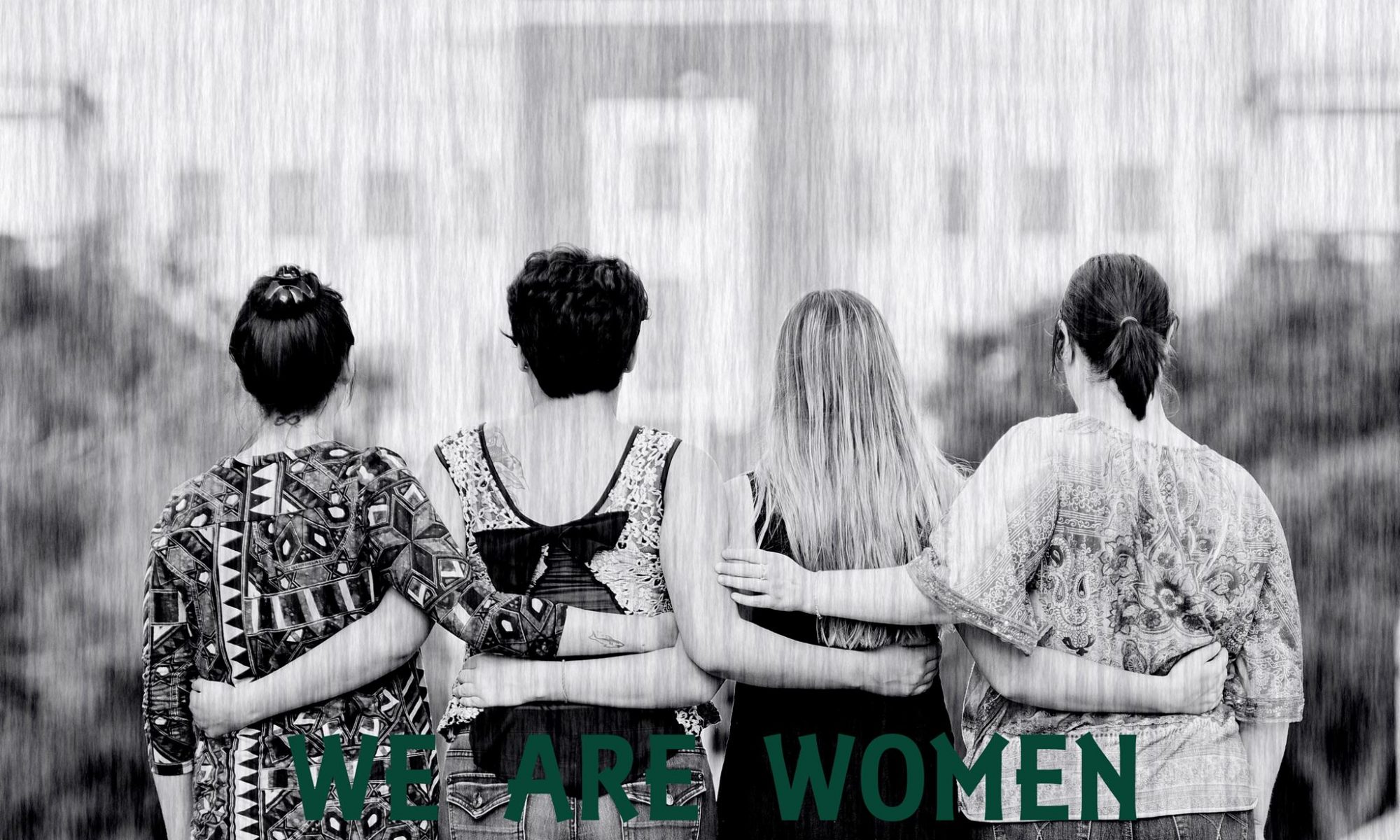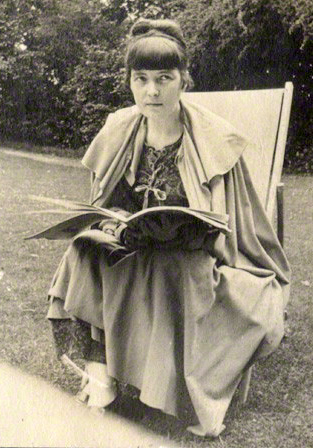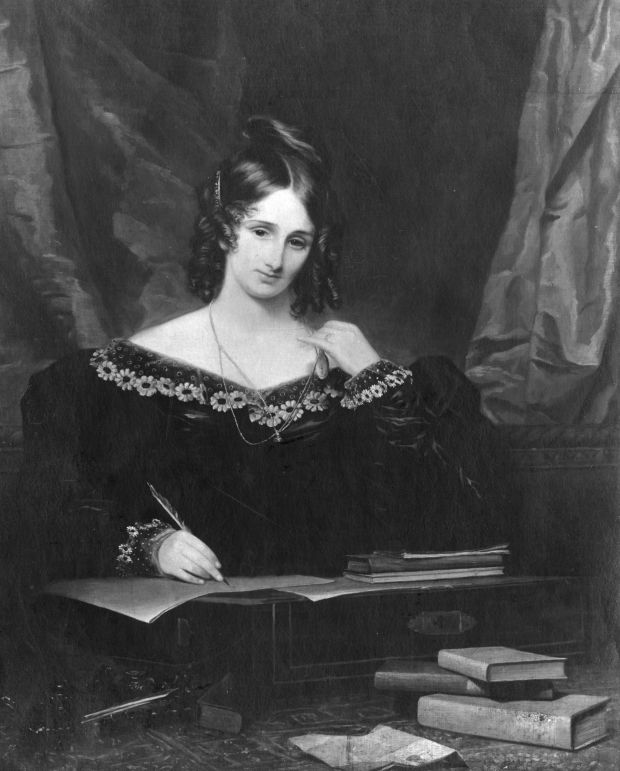
The Doll’s House by Katherine Mansfield
THE DOLL’S HOUSE
When dear old Mrs. Hay went back to town after staying with the Burnells she sent the children a doll’s house. It was so big that the carter and Pat carried it into the courtyard, and there it stayed, propped up on two wooden boxes beside the feed-room door. No harm could come of it; it was summer. And perhaps the smell of paint would have gone off by the time it had to be taken in. For, really, the smell of paint coming from that doll’s house (“Sweet of old Mrs. Hay, of course; most sweet and generous!”) — but the smell of paint was quite enough to make any one seriously ill, in Aunt Beryl’s opinion. Even before the sacking was taken off. And when it was . . .
There stood the doll’s house, a dark, oily, spinach green, picked out with bright yellow. Its two solid little chimneys, glued on to the roof, were painted red and white, and the door, gleaming with yellow varnish, was like a little slab of toffee. Four windows, real windows, were divided into panes by a broad streak of green. There was actually a tiny porch, too, painted yellow, with big lumps of congealed paint hanging along the edge.
But perfect, perfect little house! Who could possibly mind the smell? It was part of the joy, part of the newness.
“Open it quickly, some one!”
The hook at the side was stuck fast. Pat pried it open with his pen- knife, and the whole house-front swung back, and-there you were, gazing at one and the same moment into the drawing-room and dining-room, the kitchen and two bedrooms. That is the way for a house to open! Why don’t all houses open like that? How much more exciting than peering through the slit of a door into a mean little hall with a hat-stand and two umbrellas! That is-isn’t it? — what you long to know about a house when you put your hand on the knocker. Perhaps it is the way God opens houses at dead of night when He is taking a quiet turn with an angel. . . .
“Oh-oh!” The Burnell children sounded as though they were in despair. It was too marvellous; it was too much for them. They had never seen anything like it in their lives. All the rooms were papered. There were pictures on the walls, painted on the paper, with gold frames complete. Red carpet covered all the floors except the kitchen; red plush chairs in the drawing-room, green in the dining-room; tables, beds with real bedclothes, a cradle, a stove, a dresser with tiny plates and one big jug. But what Kezia liked more than anything, what she liked frightfully, was the lamp. It stood in the middle of the dining-room table, an exquisite little amber lamp with a white globe. It was even filled all ready for lighting, though, of course, you couldn’t light it. But there was something inside that looked like oil, and that moved when you shook it.
The father and mother dolls, who sprawled very stiff as though they had fainted in the drawing-room, and their two little children asleep upstairs, were really too big for the doll’s house. They didn’t look as though they belonged. But the lamp was perfect. It seemed to smile to Kezia, to say, “I live here.” The lamp was real.
The Burnell children could hardly walk to school fast enough the next morning. They burned to tell everybody, to describe, to-well-to boast about their doll’s house before the school-bell rang.
“I’m to tell,” said Isabel, “because I’m the eldest. And you two can join in after. But I’m to tell first.”
There was nothing to answer. Isabel was bossy, but she was always right, and Lottie and Kezia knew too well the powers that went with being eldest. They brushed through the thick buttercups at the road edge and said nothing.
“And I’m to choose who’s to come and see it first. Mother said I might.”
For it had been arranged that while the doll’s house stood in the courtyard they might ask the girls at school, two at a time, to come and look. Not to stay to tea, of course, or to come traipsing through the house. But just to stand quietly in the courtyard while Isabel pointed out the beauties, and Lottie and Kezia looked pleased. . . .
But hurry as they might, by the time they had reached the tarred palings of the boys’ playground the bell had begun to jangle. They only just had time to whip off their hats and fall into line before the roll was called. Never mind. Isabel tried to make up for it by looking very important and mysterious and by whispering behind her hand to the girls near her, “Got something to tell you at playtime.”
Playtime came and Isabel was surrounded. The girls of her class nearly fought to put their arms round her, to walk away with her, to beam flatteringly, to be her special friend. She held quite a court under the huge pine trees at the side of the playground. Nudging, giggling together, the little girls pressed up close. And the only two who stayed outside the ring were the two who were always outside, the little Kelveys. They knew better than to come anywhere near the Burnells.
For the fact was, the school the Burnell children went to was not at all the kind of place their parents would have chosen if there had been any choice. But there was none. It was the only school for miles. And the consequence was all the children in the neighborhood, the judge’s little girls, the doctor’s daughters, the store-keeper’s children, the milkman’s, were forced to mix together. Not to speak of there being an equal number of rude, rough little boys as well. But the line had to be drawn somewhere. It was drawn at the Kelveys. Many of the children, including the Burnells, were not allowed even to speak to them. They walked past the Kelveys with their heads in the air, and as they set the fashion in all matters of behaviour, the Kelveys were shunned by everybody. Even the teacher had a special voice for them, and a special smile for the other children when Lil Kelvey came up to her desk with a bunch of dreadfully common-looking flowers.
They were the daughters of a spry, hardworking little washerwoman, who went about from house to house by the day. This was awful enough. But where was Mr. Kelvey? Nobody knew for certain. But everybody said he was in prison. So they were the daughters of a washerwoman and a gaolbird. Very nice company for other people’s children! And they looked it. Why Mrs. Kelvey made them so conspicuous was hard to understand. The truth was they were dressed in “bits” given to her by the people for whom she worked. Lil, for instance, who was a stout, plain child, with big freckles, came to school in a dress made from a green art-serge table-cloth of the Burnells’, with red plush sleeves from the Logans’ curtains. Her hat, perched on top of her high forehead, was a grown-up woman’s hat, once the property of Miss Lecky, the postmistress. It was turned up at the back and trimmed with a large scarlet quill. What a little guy she looked! It was impossible not to laugh. And her little sister, our Else, wore a long white dress, rather like a nightgown, and a pair of little boy’s boots. But whatever our Else wore she would have looked strange. She was a tiny wishbone of a child, with cropped hair and enormous solemn eyes-a little white owl. Nobody had ever seen her smile; she scarcely ever spoke. She went through life holding on to Lil, with a piece of Lil’s skirt screwed up in her hand. Where Lil went our Else followed. In the playground, on the road going to and from school, there was Lil marching in front and our Else holding on behind. Only when she wanted anything, or when she was out of breath, our Else gave Lil a tug, a twitch, and Lil stopped and turned round. The Kelveys never failed to understand each other.
Now they hovered at the edge; you couldn’t stop them listening. When the little girls turned round and sneered, Lil, as usual, gave her silly, shamefaced smile, but our Else only looked.
And Isabel’s voice, so very proud, went on telling. The carpet made a great sensation, but so did the beds with real bedclothes, and the stove with an oven door.
When she finished Kezia broke in. “You’ve forgotten the lamp, Isabel.”
“Oh, yes,” said Isabel, “and there’s a teeny little lamp, all made of yellow glass, with a white globe that stands on the dining-room table. You couldn’t tell it from a real one.”
“The lamp’s best of all,” cried Kezia. She thought Isabel wasn’t making half enough of the little lamp. But nobody paid any attention. Isabel was choosing the two who were to come back with them that afternoon and see it. She chose Emmie Cole and Lena Logan. But when the others knew they were all to have a chance, they couldn’t be nice enough to Isabel. One by one they put their arms round Isabel’s waist and walked her off. They had something to whisper to her, a secret. “Isabel’s my friend.”
Only the little Kelveys moved away forgotten; there was nothing more for them to hear.
Days passed, and as more children saw the doll’s house, the fame of it spread. It became the one subject, the rage. The one question was, “Have you seen Burnells’ doll’s house?” “Oh, ain’t it lovely!” “Haven’t you seen it? Oh, I say!”
Even the dinner hour was given up to talking about it. The little girls sat under the pines eating their thick mutton sandwiches and big slabs of johnny cake spread with butter. While always, as near as they could get, sat the Kelveys, our Else holding on to Lil, listening too, while they chewed their jam sandwiches out of a newspaper soaked with large red blobs.
“Mother,” said Kezia, “can’t I ask the Kelveys just once?”
“Certainly not, Kezia.”
“But why not?”
“Run away, Kezia; you know quite well why not.”
At last everybody had seen it except them. On that day the subject rather flagged. It was the dinner hour. The children stood together under the pine trees, and suddenly, as they looked at the Kelveys eating out of their paper, always by themselves, always listening, they wanted to be horrid to them. Emmie Cole started the whisper.
“Lil Kelvey’s going to be a servant when she grows up.”
“O-oh, how awful!” said Isabel Burnell, and she made eyes at Emmie.
Emmie swallowed in a very meaning way and nodded to Isabel as she’d seen her mother do on those occasions.
“It’s true-it’s true-it’s true,” she said.
Then Lena Logan’s little eyes snapped. “Shall I ask her?” she whispered.
“Bet you don’t,” said Jessie May.
“Pooh, I’m not frightened,” said Lena. Suddenly she gave a little squeal and danced in front of the other girls. “Watch! Watch me! Watch me now!” said Lena. And sliding, gliding, dragging one foot, giggling behind her hand, Lena went over to the Kelveys.
Lil looked up from her dinner. She wrapped the rest quickly away. Our Else stopped chewing. What was coming now?
“Is it true you’re going to be a servant when you grow up, Lil Kelvey?” shrilled Lena.
Dead silence. But instead of answering, Lil only gave her silly, shame-faced smile. She didn’t seem to mind the question at all. What a sell for Lena! The girls began to titter.
Lena couldn’t stand that. She put her hands on her hips; she shot forward. “Yah, yer father’s in prison!” she hissed, spitefully.
This was such a marvellous thing to have said that the little girls rushed away in a body, deeply, deeply excited, wild with joy. Someone found a long rope, and they began skipping. And never did they skip so high, run in and out so fast, or do such daring things as on that morning.
In the afternoon Pat called for the Burnell children with the buggy and they drove home. There were visitors. Isabel and Lottie, who liked visitors, went upstairs to change their pinafores. But Kezia thieved out at the back. Nobody was about; she began to swing on the big white gates of the courtyard. Presently, looking along the road, she saw two little dots. They grew bigger, they were coming towards her. Now she could see that one was in front and one close behind. Now she could see that they were the Kelveys. Kezia stopped swinging. She slipped off the gate as if she was going to run away. Then she hesitated. The Kelveys came nearer, and beside them walked their shadows, very long, stretching right across the road with their heads in the buttercups. Kezia clambered back on the gate; she had made up her mind; she swung out.
“Hullo,” she said to the passing Kelveys.
They were so astounded that they stopped. Lil gave her silly smile. Our Else stared.
“You can come and see our doll’s house if you want to,” said Kezia, and she dragged one toe on the ground. But at that Lil turned red and shook her head quickly.
“Why not?” asked Kezia.
Lil gasped, then she said, “Your ma told our ma you wasn’t to speak to us.”
“Oh, well,” said Kezia. She didn’t know what to reply. “It doesn’t matter. You can come and see our doll’s house all the same. Come on. Nobody’s looking.”
But Lil shook her head still harder.
“Don’t you want to?” asked Kezia.
Suddenly there was a twitch, a tug at Lil’s skirt. She turned round. Our Else was looking at her with big, imploring eyes; she was frowning; she wanted to go. For a moment Lil looked at our Else very doubtfully. But then our Else twitched her skirt again. She started forward. Kezia led the way. Like two little stray cats they followed across the courtyard to where the doll’s house stood.
“There it is,” said Kezia.
There was a pause. Lil breathed loudly, almost snorted; our Else was still as a stone.
“I’ll open it for you,” said Kezia kindly. She undid the hook and they looked inside.
“There’s the drawing-room and the dining-room, and that’s the-”
“Kezia!”
Oh, what a start they gave!
“Kezia!”
It was Aunt Beryl’s voice. They turned round. At the back door stood Aunt Beryl, staring as if she couldn’t believe what she saw.
“How dare you ask the little Kelveys into the courtyard?” said her cold, furious voice. “You know as well as I do, you’re not allowed to talk to them. Run away, children, run away at once. And don’t come back again,” said Aunt Beryl. And she stepped into the yard and shooed them out as if they were chickens.
“Off you go immediately!” she called, cold and proud.
They did not need telling twice. Burning with shame, shrinking together, Lil huddling along like her mother, our Else dazed, somehow they crossed the big courtyard and squeezed through the white gate.
“Wicked, disobedient little girl!” said Aunt Beryl bitterly to Kezia, and she slammed the doll’s house to.
The afternoon had been awful. A letter had come from Willie Brent, a terrifying, threatening letter, saying if she did not meet him that evening in Pulman’s Bush, he’d come to the front door and ask the reason why! But now that she had frightened those little rats of Kelveys and given Kezia a good scolding, her heart felt lighter. That ghastly pressure was gone. She went back to the house humming.
When the Kelveys were well out of sight of Burnells’, they sat down to rest on a big red drain-pipe by the side of the road. Lil’s cheeks were still burning; she took off the hat with the quill and held it on her knee. Dreamily they looked over the hay paddocks, past the creek, to the group of wattles where Logan’s cows stood waiting to be milked. What were their thoughts?
Presently our Else nudged up close to her sister. But now she had forgotten the cross lady. She put out a finger and stroked her sister’s quill; she smiled her rare smile.
“I seen the little lamp,” she said, softly.
Then both were silent once more.



















